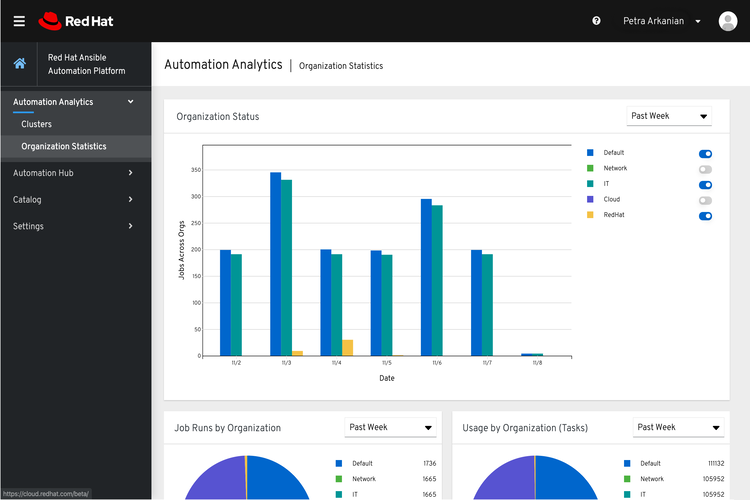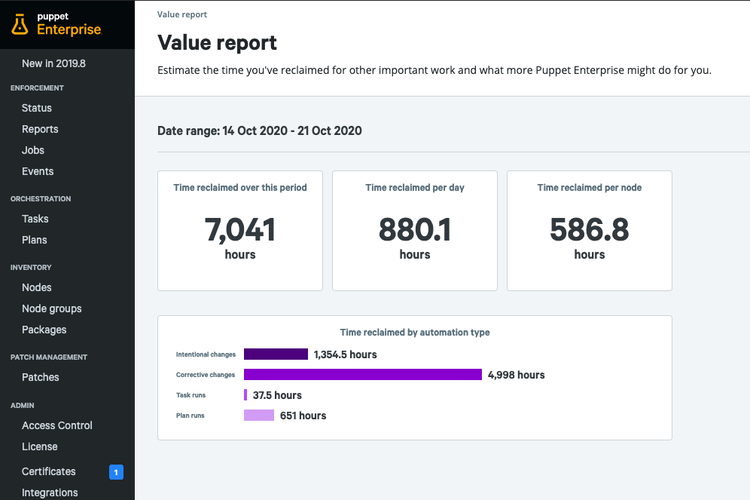A development and operations (DevOps) tool helps automate the software development procedure. DevOps is the fusion of software, practices, and philosophies that enhance an organization’s capability to come up with applications and services at high speed.
DevOps helps organizations operate and evolve products at a fast pace, thereby enabling them to better serve customers and effectively compete in the market. A DevOps model brings together development and operations teams. These teams use a technology stack and tooling to automate software development processes.
DevOps tools automate manual processes, keep engineers in control of the high speed that is permitted by DevOps, and help teams manage complicated environments at scale.
The benefits of DevOps include:
- Security
- Improved collaboration
- Scalability
- Reliability
- Rapid delivery
- High velocity of innovation
Read on to grasp the key features and differences of Ansible and Puppet.
Also read: What is NetDevOps?
What is Ansible?

Red Hat Ansible Automation Platform delivers streamlined information technology (IT) automation that ends manual, repetitive processes and frees up DevOps teams to attend to more pressing matters.
The DevOps tool’s use cases include provisioning, configuration management, application deployment, continuous delivery, network and security automation, orchestration, and endpoint protection.
Key Differentiators
- Automation Execution Environments are portable, consistent, and defined environments packed as containers for executing Ansible roles and playbooks.
- Ansible Content Collections simplify the process of deploying the latest certified modules.
- Automation Controller is the control plane for the platform that helps standardize how automation is audited, delegated, initiated, and deployed.
- Ansible Content Tools are designed to simplify the process of building and deploying execution environments.
- Automation Mesh helps you automate at scale in a cloud-native manner. It gives you reporting, control, and visibility as well as flexibility in planning complex, remote, or distributed automation deployments.
- Red Hat Insights helps keep automations running optimally and efficiently, pinpoint where particular jobs are failing, and report across the IT infrastructure.
- Other features include Automation Services Catalog and Automation Hub.
Pricing: Enjoy a free 60-day trial today. Red Hat Ansible Automation Platform is available in Standard and Premium editions. The Standard edition is ideal for enterprise IT operations, while the Premium edition is ideal for mission-critical DevOps. Reach out to the Ansible team for a custom quote.
What is Puppet?

Puppet Enterprise is a DevOps tool that enables you to automate and manage IT infrastructure and complicated workflows easily. The platform combines model-based and task-based capabilities that enable DevOps teams to scale their multi-cloud IT infrastructure as the automation footprint increases.
Key Differentiators
- Puppet Enterprise helps DevOps teams quicken application deployment timeframes with a prescriptive and simple manner to build, deploy, test, and promote infrastructure code.
- With Puppet Forge, you can integrate shared content or reuse existing code to orchestrate complex plans and tasks to deploy applications.
- Workflow- and model-based automation types offer greater infrastructure management flexibility.
- Prebuilt patching task automation makes it simpler and quicker to keep hosts compliant, secure, and healthy by replacing error-prone and time-consuming steps.
- Puppet Comply helps scale and automate each stage of the compliance lifecycle.
- With Impact Analysis, you can determine the impact of potential code changes.
- Self-service automation enables teams outside of the central IT organization to manage their own IT infrastructure automation.
- Data-driven insights help determine automation performance.
Pricing: You can try a full-featured, free trial for up to 10 nodes. Contact the Puppet sales team for pricing information.
Ansible vs. Puppet
Here is how the DevOps tools compare:
| Features | Ansible | Puppet |
| Ability to Understand Requirements |  |
 |
| Management and Scheduling |  |
|
| Modules |  |
|
| Graphical User Interface (GUI) |  |
|
| Pricing Flexibility |  |
 |
| Ease of Use |  |
|
| Ease of Deployment |  |
|
| Quality of End-User Training |  |
 |
| Availability of Third-Party Resources |  |
 |
| Ease of Integration Using Standard Tools and Application Programming Interfaces (APIs) |  |
|
| Scalability |  |
|
| Availability |  |
|
| Integration |  |
 |
| Customization |  |
 |
| Service and Support |  |
|
| Willingness to Recommend |  |
 |
| Overall Capability Score |  |
 |
Choosing DevOps Tools
A DevOps tool helps automate software development processes like orchestration, application deployment, continuous delivery, and configuration management, thereby reducing manual effort. Ansible and Puppet offer an assortment of features and should be further examined before making a purchase commitment.
Before making a purchase decision, be sure to visit the websites of the DevOps tools, scrutinize product catalogs, reach out to an expert if you need assistance, and review peer opinions.
Read next: Best DevOps Tools & Software of 2021
The post Ansible vs. Puppet: 2022 Software Comparison appeared first on Enterprise Networking Planet.

